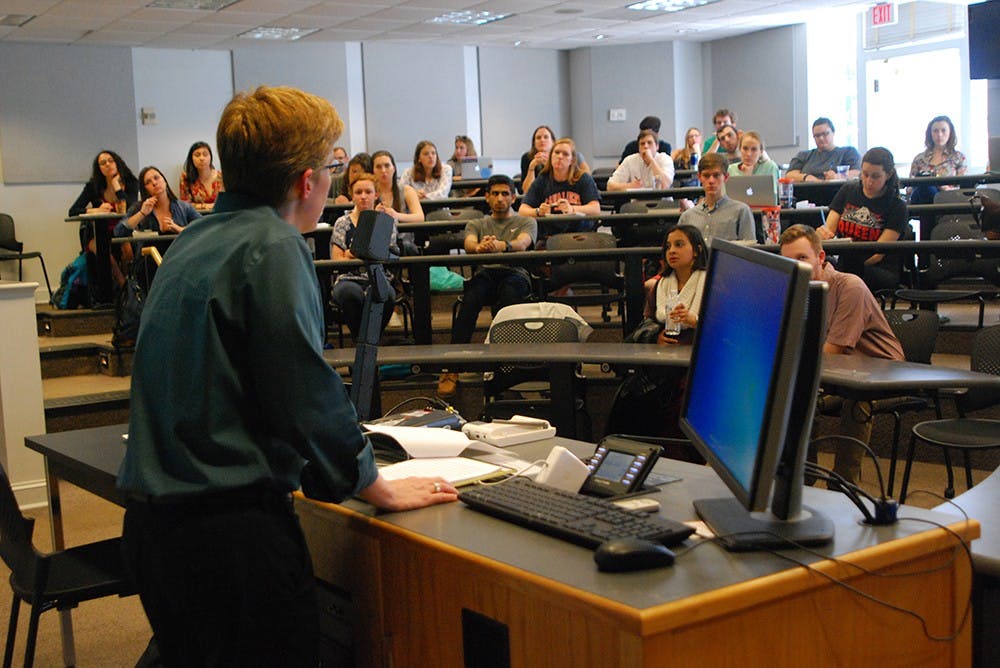The Women, Gender & Sexuality Department hosted a lecture titled “Perverse Ambitions, Deviant Careers: Toward a Queer History of the Modern American Workplace” by Assoc. Prof. Margot Canaday from Princeton University. Roughly 70 attendees listened to the talk on how the experience of gays and queer individuals in the workplace has developed over time.
History and WGS Prof. Corinne Field contacted Canaday to speak as part of the Bernard Mayes LGBTQ Lecture Series. Canaday’s prominence in the field made her a top choice for the lecture series.
“She is probably the leading historian of LGBT citizenship in 20th century America and for the Bernard Mayes Lecture Series, we wanted a historian,” Field said. “She really has reframed the way people think about 20th century gay history in the U.S.”
Canaday’s talk focused on gay and queer experiences in the workplace in the postwar period, particularly the 1950s. Because occupation was associated with identity, gay citizens either had to conform to the “straight world of work” or the “queer world of work,” Canaday said.
“Workplaces are considered both arenas of uniforms and conformity,” Canaday said. “We believe the job makes the person. Asking someone what they do has become analogous to who they are.”
Canaday also emphasized that gay individuals who worked in the “straight world of work” were often forced to downplay their ambition because of a fear of being overly visible. Because one’s personal life is more closely scrutinized in higher positions, gay workers typically maintained a “severely curbed ambition.”
“The straight world of work was governed by a bargain between employers and employees,” Canaday said. “Employers tried not to see, and employees tried not to be seen.”
Canaday said that during this time, lesbian individuals faced even more adversity because they identified both as women and as queer — and both groups dealt with discrimination in the workplace.
“Lesbians could not imagine themselves as chief of surgery, they could not imagine themselves as doctors,” Canaday said. “This encouraged lesbians to work hard for the company, but to keep their aspirations in check.”
Canaday also said that because queer individuals were so careful in monitoring their behavior at work so as not to reveal their private lives, they were more willing to work for less money.
“Gay employees were literally a bargain, which helps explain the employers’ reluctance to know,” Canaday said. “LGBTs can also be underpaid respective to responsibility and skill level.”
Canaday closed her lecture by explaining how the gay liberation movement of the 1970s and 1980s allowed gay individuals to become more visible in the “straight world of work” and removed some stigmas of the “queer world of work.”
“Across the 1970s and certainly by the 1980s, the bargain was losing its power,” Canaday said. “Just at the moment when employers needed to shed workers from their payroll, gay employees felt less need to be invisible.”
Following the talk, attendees asked for Canaday’s opinion on modern corporate reforms.
“Corporations have been way ahead of labor, unions and government in bestowing domestic partner benefits and adopting anti discrimination policies,” Canaday said. “I would argue there's a pretty significant difference between claiming rights as a citizen and having your rights bestowed by a corporation.”
Third-year College student Connor Roessler, who emphasized the talk’s importance, said it is important University students recognize the breadth of LGBTQ issues.
“I think a lot of times people think about LGBTQ rights as just a question of marriage and there’s a much larger history than that,” Roessler said.
While the lecture had a historical focus, Field said the talk was still relevant because LGBTQ life in the workplace remains an issue.
“In terms of current politics, it’s important to turn to work as an aspect of life that still lacks protections,” Field said.







